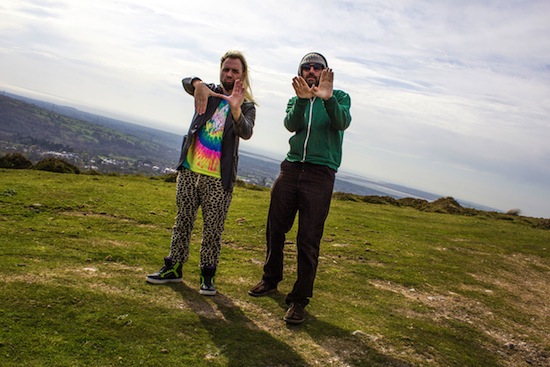Gruff Rhys picks me up outside the train station in Bangor, a place that once filled me with wanderlust and now drowns me in bittersweet hiraeth. It’s where I went to secondary school, rented my first bedsit at age sixteen and where, that very same week, I first met the local legend and Super Furry Animal frontman, outside the old Our Price record shop (now a computer games shop, obviously). He signed a packet of fags for me, and a decade later he sang on one of my Akira The Don records.
Since I last saw Gruff he’s travelled America in the footsteps of his his ancestor John Evans, who as a young man sailed West in search of Welsh People and changed history. I’ve been living out in Los Angeles, learning the ways of PeakWave. But today we’re back where we began, in Cymru, Hen Wlad Fy Nhadau, bouncing through the hills and valley’s of North Wales in Gruff’s great big van to Waunfawr, the home of the subject of his new album, book, and movie.
"This is where John Evans lived," says Gruff, pointing at little stone house on the side of the little windy road on a 45% angle. "And up there’s where he’d have gone for walks."
We drive a little further up the hill, and suddenly the brow gives way, and we’re on top of Wales.
The world stretches out as far as the eye can see. To the left below, a village, little stone houses chuffing out smoke, floating heavenward like thought bubbles, mingling with clouds that hang sleepily around the mountains like puffy tiraras. Behind us looms Mynydd Mawr (literally "big mountain"), also known as The Elephant, though from here it looks more like a dragon. And in front, the sea, rolling out into infinity.
"They ask, why did this guy from North Wales wanna go to America?" We look around, taking in the same insane cinematic panorama his ancestor did over two hundred years ago. "And it’s like, OH."
He laughs, then tells me the story of brave John Evans, a boy from Here who went over There.
Gruff Rhys: He went in 1792. He went to London first, when he was 21. He was trying to raise money. He went to Llanrwst Eisteddfod in 1790 and heard a speech by Iolo Morganwg [famed Welsh poet, literary forger and opium fiend] saying the US government should give Wales a piece of America, ‘cos we basically own it and we need to find the Welsh-speaking tribe and prove that they exist.
Where did that come from?
GR: John Dee made it up. He was working for Queen Elizabeth. He basically fabricated it.
Is that the wizard guy who all the various visual ideas for Merlin and Gandalf and them came from?
GR: Er, not sure. He was basically more like a public relations guru.
So why was he making up shit about the Welsh having discovered America?
GR: Well, Wales had just been annexed by England, and he’d upgraded England to become the British Empire. And he was the first to give it the new name. All new, deluxe, kinda rebrand. He wanted to jump into America… So he put a claim on America by using a previous Welsh prince who never existed, probably.
Was that Mabon?
GR: Um. Madoc. Madoc had been mentioned in poetry but there’s no hard evidence he existed. His dad [King Owain Of Gwynedd] existed, and his mum. But there’s no record that his dad ever had any sons. John Dee went, ah, ‘I’ll have a bit of that’. And he said that Madoc had discovered America while it was empty and gave Elizabeth the allotment to claim half of America away from the Spanish, like. So John Evans went to London, and hung out with all these Welsh ex-pats who were into poetry and anti-royalty. They were revolutionary, they believed in the American revolution, and the French revolution. It was a class issue, ‘cos, you know, people didn’t even own their own land, you know, they were scraping a living off the common land, here. John believed in the American revolution and that people shouldn’t be ruled by police.
Iolo Morganwg was on an expedition to find the Madogwys, so John Evans decided to come to London to join him and look for funding, and no one would give him any money. Then Iolo Morganwg chickened out and went back to Wales.
John Evans was a farm hand and weaver from here. He made clothes for the quarrymen. And suddenly he’s left alone to start, um, well, to go on an expedition. So he was homeless in London, and some Welsh guy felt sorry for him and loaned him enough money to reach Baltimore in the worst class of boat.
So he got in a boat. In the shit bit.
GR: In the shit bit. To Baltimore. Twenty years old. And he got a job in a surveyors office for about six months. And they taught him surveying skills. And he saved $1 and 65 cents.
What, as in looking at houses?
GR: They were squaring out grids, to build the new towns. So he hung around there for six months. Then walked into the wilderness. And then within another six months he’s in the Mississippi and everything West of the Mississippi belonged to Spain. He crossed the Mississippi, changed his name to Don Juan Evans, pledged allegiance to the Spanish king, and then, um, caught malaria.
He was in a place called New Madrid, where he almost died, and then decided to carry on anyway, so he started to walk up the Mississippi, by which point he was out of money, no clothes left, his clothes had disintegrated, and he’s walking up the river, alligators, all this stuff he’d never seen before, snakes, and ‘cos he’s from here, he had no idea what was going on!
That’s pretty much exactly what happened to me when I first went to America.
GR: I know! Ha!
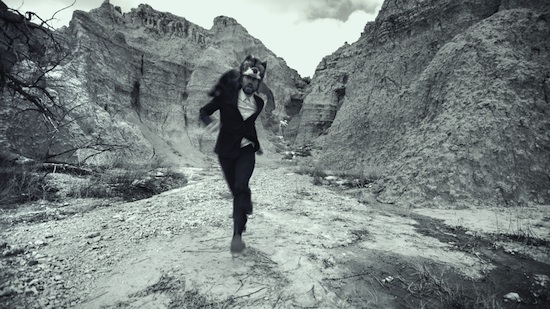
So he’s wandering up the Mississippi all naked and crazed, freaking out over alligators and fluorescent orange locusts…
GR: Yeah. And malaria’s… occurring. And he’s hallucinating.
Haha.
GR: Then he gets blinded for a period of time. By his illness. And the sun. Baking his brain like a cake. Then he got to St Louis. And it was controlled by the French but still in Spanish Louisiana, New Spain, which was a third of North America. So, it was populated by French people, and they didn’t believe the story that he was looking for Welsh people, so they jailed him.
What did they think he was doing?
GR: They thought he was a US spy.
A naked, malaria-ridden, hallucinating…
GR: US spy, yeah! [laughs] And they put him in jail, and it was winter, minus 20, and they had him in a dungeon, in St Louis, and then they put him in the stocks, and then some guy came over the river to vouch for him.
What?! Who?
GR: Well, it was, there was a judge called George Turner, who came from the US, to vouch for him. He had a good relationship with the governor of St Louis, which was a village of about 2000 people. And then a Scottish general called Gerald McKay had been asked by the Spanish to lead an expedition up the Missouri river from St Louis to look for the North West Passage… and he’d met another Welsh guy along the way, John Riorkins in Cincinnati, and this Welsh guy knew John Evans, and went, ah, there’s this guy John Evans, he’s west, he’s looking for the Welsh speakers and you should get him on your expedition ‘cos he’ll be able to talk to the tribes you meet. So General McKay got him out and made him second in command.
Hahaha!
GR: And this Spanish expedition assembled in Missouri. And they started up the Missouri river and were leaving behind European style civilisation, and meeting the river tribes, going up the Missouri for 18,000 miles. They lived with the Omaha tribe. Chief Blackbird blockaded the expedition, you know, like, ‘there’s no way I’m gonna let you go up here with guns and arm the Mochotta tribe upriver. I’m not mad’. So, they were stuck with the Omaha tribe, who fed them and they were reasonable people, but they didn’t want them taking shit to their enemies. So they were with them for about six months. And then chief Blackbird let John Evans go onwards with some of the people, and McKay made Evans the leader of the expedition. On first attempt they were chased back 300 miles by the Lacotta tribe. On his second attempt they made a deal with them and, they carried on, and then he was stopped and blockaded by the Arikara Tribe, and spent six weeks with them, and then he thought that the Madogwys, the decedents of Madoc, were the Mandan (http://en.wikipedia.org/wiki/Mandan) tribe.
Because of the ‘Ma’?
GR. Yeah. It was very tenuous. So he got there, and he lived with them for nine months.
But they didn’t speak any Welsh
GR: They didn’t speak any Welsh. By which point he was on the 49th parallel. And he was blowing up British forts with cannons and stuff on the way upriver.
Hahaha!
GR: But when he got to the 49th parallel he raised the Spanish flag, and then sort of accidentally, possibly, annexed that whole chunk of North America into what became the USA. Otherwise it would have been Canadian. He spent nine months in this weird situation. Britain and Spain were at war in Europe, and he was holding one of the longest borders of the Spanish empire.
And this was still just him and his few mates?
GR: Yeah. But they were completely dependent on the Mandan tribe who let them stay with them over the winter. By this point he was 26-years-old, and he walked thousands of miles and met lots of tribes; tribes that were from further west as well. And he came to the conclusion that there were no decedents of Madoc in America.
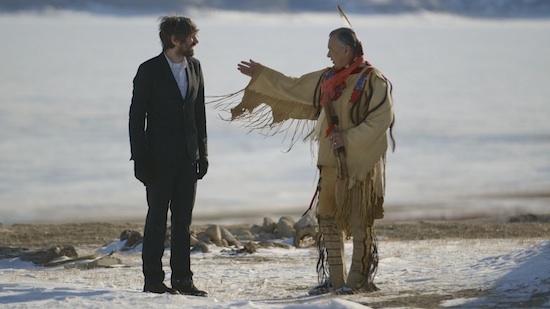
After spending nine months with the tribe, the Canadians came to try and kill him. And he was saved by the tribe. His Mandan interpreter jumped on top of the assassin. And then he decided to go back to St Louis. He couldn’t get to the Pacific because he’d run out of money. Spanish Louisiana was getting bankrupt – the backup that was supposed to come upriver for him never came. And he was just stranded in what’s now North Dakota, so its like, minus 40. He spent the winter there. And the Mandan were having like, buffalo dances, and Okipa ceremonies where people hang themselves with hooks through their chest, you know . They were one of the most developed tribes, in terms of culture. And John’s from this Methodist hotspot. Really dour, his parents were devout Methodists. So it’d have been quite a change of scenery. So he’s hanging out with them, then he went back to St Louis. And the governor of Spanish Louisiana was impressed with the way he captured the North Americas from the Canadians…
With two guys and some cannons.
GR: He talked his way 1800 miles up the Missouri River. He talked his way to America, you know, he never paid the guy back he got the loan from.
Just a charismatic motherfucker.
GR: Yeah. And then, um, he ended up in New Orleans. When he was 28. He got a job with the governor. By which point, you know, he was depressed, because he failed in his quest to find Madoc’s tribe. And well, we can speculate on the reasons, but he died at 29. And was thrown in an anonymous grave. And that was that.
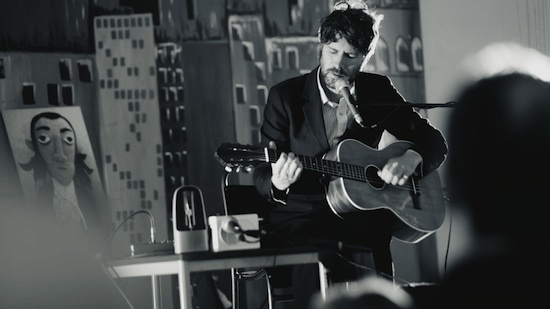
What, you think he pissed someone off? Owed someone money?
GR: Nah, it was probably something boring you know, like cholera. And he’d mapped the whole Missouri basin, and mapped the Yellowstone river, and when the Spanish sold that particular land to the US – well, they sold it to the French and the French sold it to the US. And then the Americans got hold of John Evans’ maps, and they sent Lewis and Clark on the same expedition again.
Who?
GR: Lewis and Clark.
I thought you said Lois and Clark. The New Adventures of Superman.
GR: Yeah! I wonder, maybe that’s where they got the names. So they used his maps for the first year of their expedition to find the Pacific Ocean.
And they worked?
GR: Yeah!
So he didn’t make the whole thing up.
GR: No, no, they were fairly exact maps, it was really spot on. And so he had a kind of weird, profound influence on the geography of the US, but by accident, because he was trying to do something completely different. He was trying annex it for the Welsh.
And all because Queen Elizabeth’s crazy wizard PR made up some shit.
GR: Yeah, but I suppose the Welsh loved that shit. Actually we did, like, ‘Yeah! Aye!’ But, its just very sad, you know, like, looking back.
And he was related to you?
GR: Yeah. Well, its pretty tenuous. Imagine that we’re all related here [Gruff gestures at the valley and mountains around us] I’m descended from his mother’s brother. So. And its a long time ago.
But its still the same shit, really. People languishing in relative poverty under the elite scum.
GR: Yeah!
And people fucking off to London to find like-minded hipsters. And then fucking off to America to find the dream.
GR: Yeah! Exactly! But, because, we’re still governed by the fucking House Of Lords, and the fucking Queen, and elites, like the Tory cabinet. Which was exactly the same you know, 220 years ago when he left. Its exactly the same deal. Which is incredibly depressing. The French had their revolution and at the same time the Americans, and they don’t have archaic models of governance like the monarchy and the House Of Lords. I mean, we’re still stuck with it. And that’s what John Evans was trying to sort out.
David Cameron’s speech the other day, condemning the Welsh NHS. He personally slashed the Welsh budget by a third. Which is unprecedented in a modern country to have someone come in and slash a third of the budget. Like, how do you cope with that? And that’s in his name, and he’s got the fucking… um… you know, its like. Ha! [Gruff sighs, exasperatedly].
How old were you when you first went to America?
GR: 26. It was incredible. It was just for a gig, for a three days in New York. It was like an insane hallucination. And then went back to do another gig two years later and thought, ‘ah, I’ll stay for a bit longer’. I met some people in the bar and they went, ‘where you staying?’, and I was going, ‘oh, in a hotel’ and they were, ‘chuck out the hotel, you can stay in our house, we’ll give you a key’. So next thing was staying in people’s house with a key. Then they went, ‘oh, do you wanna come on holiday?’ So I was, ‘oh yeah! Great!’ And then went on holiday with these people, you know. It’s dead hospitable.
Then I toured lots with Super Furries, all over America, lots of times. So its a bit weird. I’m a bit suspicious of calling a record American Interior. I’m hoping I can get away with it. But I’m not trying to make an Americana roots record.
I was gonna ask you about that. Why that name?
GR: ‘Cos the film’s called American Interior. And its like, theme music for the film. The title track thing. The words ‘American Interior’ popped up a lot. I wrote a book about the tour, about that essential third of America. You know when you give something a name, and it’s sort of too complicated to change it in the end? Even though you think, oh, I could maybe call it something so it’s not attached too geographically.
Its a dope name though. And its a dope album. What’s that one about synthesisers in Welsh with the double A?
GR: ‘Allweddellau Allweddol’.
Double A. Coulda called it ‘Allweddellau Allweddol Addawol’ and gone for the triple. What’s John Evans got to do with synthesisers?
GR: Nah, it’s like, when he’s in the malarial hallucination going upriver, and he starts to meet all the tribes of the Missouri basin, it’s like a soundrack for that part of his life. Where he’s in, you know, a desert style situation, hallucinating, losing his mind, and it’s just maybe thinking an amazing synthesiser, using that as a kind of guide, like a floating synthesiser in the sky, like, the synthesiser’s speaking to him, up in the sky.
That’s the one that needs an animated Pete Fowler video then.
GR: Haha, yeah.
What was the source for that part of John Evans’ story? Specifically that Jesus In The Desert bit.
GR: When he got back to St Louis from the Mandan, he wrote a lot. He sat down and he wrote a letter to a guy in Philadelphia. When he passed through Philadelphia in 1798 he stayed with a Welsh family there.
He found some Welsh people, then.
GR: Oh, everywhere, yeah! And then four years later he sits down in St Louis, and writes a letter, saying, ‘oh, sorry I haven’t been in touch, you know, its like, this is what happened after I left your house.’ It’s this amazing sort of three page letter. Its just this insane story. And there’s chunks of him somewhere else. His journals exist. The odd letter. There’s very little proof, you know, but there’s just enough to try and piece his life together. Maybe there’s more out there.
I guess now you’re gonna find, with the record and film and book out, that loads of people are gonna send you shit about him.
GR: Yeah, yeah. People have started to get in touch. But, you know, there’s lot of conspiracy theories. Which I try to avoid. ‘Cos, maybe they’re true, but I just wanted to write what we really know, and then somehow just kind of elaborate on it. People don’t believe that he didn’t find the tribe. And they think that he made that up ‘cos he was under duress of the Spanish.
People wanna believe. Like that Fox Mulder poster. I wanna believe!
GR: Yeah, yeah.
The big story in deep conspiracy land right now, post that whole Zion 2012 Olympics thing, is giants. Giants that built America, and had coneheads, decedents of annunaki, that sort of thing. So it was giants, not Welsh people. Or maybe Welsh giants.
GR: That’s amazing. What was the one a couple of years ago, people were obsessed with, the frequency machine?
HAARP?
GR: Yeah. They said it caused earthquakes.
They shut that down now. They built a bunch of new ones though. Everyone’s got them now. The Chinese have one. Russia has one.
GR: Hahaha. Wow.
You know, we held a ritual up here [Gruff gestures at the sloping mountainside around us]. A voodoo ritual for John Evans. See, I took, like, a three foot effigy of him round America.
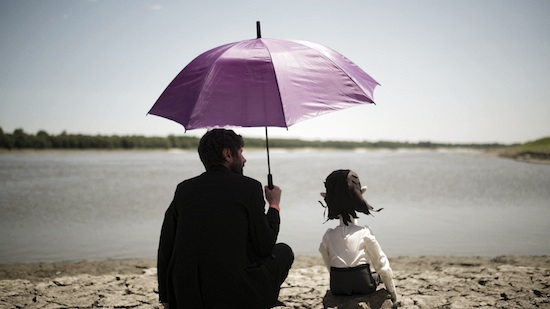
Did Pete [Fowler] make that?
GR: Yeah. Well, someone call Louise Evans made it. From Pete’s designs. It was just a visual aid, you know? ‘Cos he’d never been drawn, or painted. When we got to New Orleans people thought it was a voodoo doll. I was trying to explain, like, ‘nah, its just a visual representation of a distant relative!’
That’s kind what a voodoo doll is anyway, right?
GR: Yeah. So we bought it back, up here. And had a voodoo ceremony. Well, not a proper one. I mean, our own. In New Orleans voodoo, they give them nice things, like, nice fruit, sing songs to them. So we did that, up here. Had a fire… It was nice.
Gruff Rhys’ American Interior is out now via Turnstile

